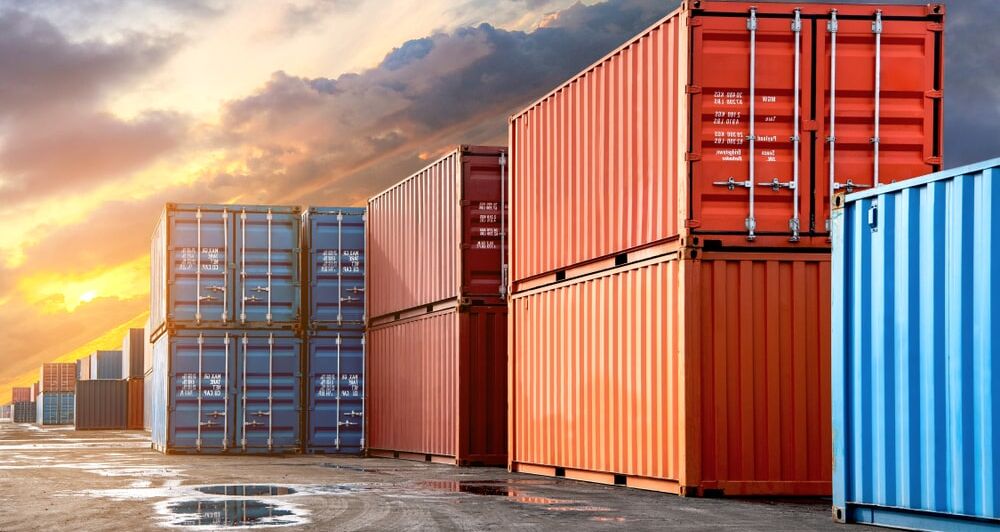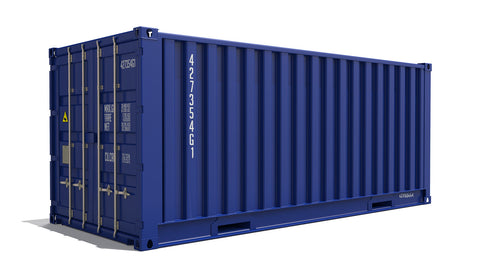Whatever You Required to Learn About Shipping Containers and Their Practical Applications
Shipping containers have developed from plain tools for transportation to versatile structures with various useful applications. Their robust layout and conventional sizing make them optimal for a series of usages past shipping. From cutting-edge housing services to lasting farming, their flexibility is noteworthy. The opportunities do not end there. Discovering their various functions discloses surprising insights right into imaginative options and modern obstacles. What various other roles could these containers play in today's globe?
The Style and Structure of Shipping Containers

Inside, containers are created to take full advantage of room, usually featuring wood or steel floor covering that can sustain significant weight. Ventilation systems may be integrated to avoid dampness accumulation, which is important for sensitive cargo. Furthermore, enhanced corners permit easy handling by cranes and forklifts, helping with smooth loading and dumping. This thoughtful design and framework contribute to the containers' adaptability across different shipping and storage space applications.
Benefits of Using Shipping Containers
While lots of transport approaches have their advantages, the use of delivery containers sticks out because of their unmatched convenience and effectiveness. Shipping containers provide a standard size, making them simple to transport and stack throughout different settings of transportation, including trains, ships, and vehicles. This standardization minimizes packing and unloading times, consequently raising total efficiency.
In addition, delivering containers are constructed from long lasting products, supplying durable security for products during transit. They are protected and weather-resistant, minimizing the risk of damage from environmental aspects or theft. Additionally, the modular style of shipping containers allows for simple personalization, making it possible for companies to adapt them for different functions, such as storage or mobile workplaces.
Finally, their transportability and cost-effectiveness make delivery containers an appealing choice for services wanting to streamline logistics and supply chain procedures. These benefits add to the expanding popularity of delivery containers in numerous markets.
Imaginative Housing Solutions With Shipping Containers
Cutting-edge housing solutions have emerged as an interesting application of shipping containers, leveraging their fundamental toughness for residential usage. These flexible frameworks offer a sustainable choice to standard building products, typically at a portion of the expense. Developers and designers have actually changed containers right into fashionable, functional homes, accommodating diverse lifestyles and preferences.

Additionally, delivering containers are eco-friendly, advertising recycling and reducing waste. Many jobs concentrate on power performance, incorporating environment-friendly roofing systems and solar panels. As urbanization rises, these ingenious real estate options offer a useful action to housing shortages while cultivating an one-of-a-kind architectural aesthetic.
Shipping Containers in Retail and Pop-Up Shops
An expanding number of stores are transforming to shipping containers as a dynamic service for retail areas and pop-up stores. These versatile frameworks supply an economical alternative to typical storefronts, enabling companies to create one-of-a-kind, attractive settings that draw in consumers. Their modular layout allows very easy transport and installation, making them optimal for seasonal or short-term retail places.
Merchants can customize delivery containers to mirror their brand identity, changing them right into aesthetically appealing stores that stand out in congested marketplaces. The small nature of containers likewise encourages effective use area, permitting for creative formats that enhance consumer circulation and interaction. Shipping containers can be situated in non-traditional places, such as vacant whole lots or urban parks, enhancing availability and foot website traffic.

As the retail landscape progresses, delivering containers supply a ingenious and flexible option that fulfills the needs of modern customers while enhancing the buying experience.
Sustainable Farming Practices Making Use Of Shipping Containers
Lasting farming practices increasingly incorporate shipping containers as ingenious solutions for agriculture - sea can for sale. These container ranches make use of hydroponics to maximize room and resource efficiency, using an affordable strategy to food manufacturing. By transforming delivery containers into blog farming hubs, farmers can attend to food safety and security and environmental concerns concurrently
Container Farming Advantages
While standard farming faces challenges such as land deficiency and climate modification, container farming offers a feasible alternative that optimizes space and sources. This cutting-edge approach allows for year-round crop manufacturing in controlled settings, decreasing dependence on weather. Container ranches use less water than traditional farming, advertising sustainability and preservation. They can be established in city areas, bringing fresh fruit and vegetables closer to customers and minimizing transportation discharges. In addition, the modular nature of shipping containers allows scalability, permitting farmers to change procedures based on need. Container farming additionally lessens chemical usage by producing a confined environment, ultimately enhancing food safety and security. As city populations expand, container farming becomes a functional option to satisfy the raising demand for neighborhood, sustainable food sources.
Hydroponics in Containers
Hydroponics, which permits plants to expand without dirt by using nutrient-rich water, grows within the boundaries of shipping containers, making it an optimal method for metropolitan farming. These containers create a regulated atmosphere that enhances temperature, light, and humidity, enabling year-round growing. With limited space in city areas, delivering containers offer a scalable solution for expanding fresh produce. Hydroponic systems within containers can include numerous methods, such as nutrient film technique (NFT) and deep water society (DWC), which optimize return while reducing water usage. This cutting-edge technique not just improves food protection but also reduces the carbon footprint connected with conventional farming techniques. Subsequently, hydroponics in containers stands for a forward-thinking option for lasting city food production.
Cost-efficient Farming Solutions
As food production encounters boosting difficulties as a result of environment adjustment and urbanization, shipping containers arise as a cost-efficient service for farming. These functional structures can be repurposed for different lasting farming practices, such as hydroponics why not try here and vertical farming. By utilizing controlled atmospheres within containers, farmers can maximize development cycles and decrease source intake, including water and plant foods. Additionally, delivering containers can be purposefully placed in metropolitan areas, minimizing transport expenses and enhancing accessibility to fresh produce. Their modular nature enables scalability, allowing farmers to increase procedures as demand expands. Furthermore, repurposing containers contributes to throw away decrease, aligning with eco-friendly farming initiatives. Overall, shipping containers present ingenious possibilities for efficient and sustainable food manufacturing.
Emergency and Calamity Alleviation Applications of Shipping Containers

Organizations regularly use delivery containers to produce mobile facilities or field hospitals, making sure that clinical care gets to those in requirement. In addition, they can be changed right into command centers for collaborating rescue operations, thus enhancing business performance during dilemmas.
Containers can be modified to store important items such as clothes, food, and water, guarding supplies till they are distributed. linked here Their wheelchair enables them to be quickly transported to numerous areas, making sure that aid gets here where it is most quickly needed. Overall, shipping containers play a critical function in boosting the performance of calamity alleviation initiatives worldwide.
Regularly Asked Inquiries
Exactly How Are Shipping Containers Transported From One Location to Another?
Shipping containers are transferred through vehicles, ships, and trains, utilizing cranes for unloading and loading. This multi-modal transportation system makes certain effective motion throughout land and sea, linking global supply chains and assisting in international trade.
What Is the Average Lifespan of a Delivery Container?
The average life expectancy of a delivery container commonly varies from 10 to 25 years, depending upon upkeep, use, and ecological aspects. Proper care can prolong their functionality, while forget might cause degeneration and damage.
Can Shipping Containers Be Modified for Various Uses?
Yes, delivering containers can be modified for various usages. They act as homes, workplaces, pop-up stores, and storage space units. Their versatility enables creative adjustments, making them ideal for a vast array of applications.
Are Shipping Containers Eco-friendly?
Shipping containers can be eco-friendly, as they promote repurposing and recycling. Their toughness lowers waste, while their usage in different real estate and companies decreases the demand for new products, contributing to sustainable methods.
Just how Do I Choose the Right Size Shipping Container?
To select the right dimension delivery container, one have to assess storage needs, consider the desired use, and examine area schedule - Shipping Containers. Common sizes consist of 20-foot and 40-foot containers, each offering numerous storage and transportation demands efficiently
Ingenious housing options have actually emerged as an exciting application of delivery containers, leveraging their intrinsic strengths for residential usage. The versatility of delivery containers enables for imaginative layouts, from single-unit houses to complicated multi-container plans. Lasting farming techniques significantly include shipping containers as cutting-edge options for agriculture. In addition, the modular nature of shipping containers makes it possible for scalability, enabling farmers to change operations based on need. Hydroponics, which allows plants to expand without soil by making use of nutrient-rich water, flourishes within the confines of shipping containers, making it a perfect technique for urban agriculture.